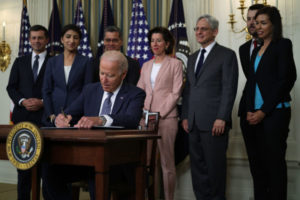
The Justice Department revises policing policies, a federal appeals court holds Tennessee anti-abortion law unconstitutional, and more…
IN THE NEWS
- The U.S. Department of Justice revised its policing policies to prohibit federal law enforcement officers from using chokeholds and no knock warrants. The Justice Department acknowledged that chokeholds have “too often led to tragedy” and ordered that chokeholds be prohibited unless federal officers reasonably believe that they or others are in imminent risk of physical danger or death. The Justice Department also ordered that federal officers only be permitted to use “no knock” entries after they obtain two separate agency authorizations or if there is an imminent danger of physical violence. U.S. Attorney General Merrick Garland stated that “building trust and confidence between law enforcement and the public we serve is central” to the Justice Department’s mission.
- A federal appellate court affirmed a lower court’s decision that barred a Tennessee law restricting abortion. The law criminalized doctors performing abortions after detecting a fetal heartbeat and performing an abortion of a fetus with potential Down syndrome, among other things. The court explained that the law was a “substantial obstacle” to a woman’s constitutional right to an abortion because most women do not receive an abortion before a doctor can detect a fetal heartbeat. Writing for the majority, Judge Martha Craig Daughtrey claimed that the court would contradict precedent and act as “judicial activists” if it upheld the law.
- U.S. Citizenship and Immigration Services (USCIS) announced a COVID-19 vaccine requirement for individuals undergoing the immigrant medical examination process. Immigrant medical examinations are typically required for individuals applying for legal permanent status, among others. The new COVID-19 vaccine requirement is based on the Centers for Disease Control’s determination that the vaccine is “in the interest of public health.”
- In a 3-2 vote, the Federal Trade Commission (FTC) rescinded its prior guidance on assessing the competitive impact of vertical mergers. The existing guidance documents—the Vertical Merger Guidelines, issued jointly with the Justice Department, and the FTC’s Vertical Merger Commentary—were published in 2020. The FTC stated that the withdrawn documents contain “unsound economic theories that are unsupported by the law or market realities.” The Justice Department stated that it would conduct its own review of the guidelines and work with the FTC to seek public comment—a process that has not yet occurred for the current guidelines.
- President Biden established an initiative that will require various agencies, such as the U.S. Department of Education and the U.S. Department of Commerce, to create action plans increasing educational and economic opportunities for Hispanic communities. The agencies’ plans should address federal employment barriers for Hispanic people, challenges brought on by the COVID-19 pandemic for higher education institutions that serve Hispanic communities, and discriminatory policies that hinder educational and economic opportunities for Hispanic communities, among other things. The initiative also created a commission that will advise President Biden on approaches to strengthening educational and professional development for Hispanic communities.
- The Justice Department’s Antitrust Division and the FTC issued a joint statement on maintaining competition during the Hurricane Ida recovery efforts. The agencies noted that existing antitrust rules allow firms to collaborate when responding to disasters, even in cases where the collaboration involves two competitors. The agencies cautioned, however, that attempts to exploit individuals and communities impacted by Hurricane Ida will not be tolerated. The Justice Department’s Antitrust Division cited its history of taking action against parties who engage in anticompetitive or fraudulent schemes after disasters.
- The Responsible Offshore Development Alliance, a coalition representing the interests of fishermen and the fishing industry, requested judicial review of the federally approved Vineyard Wind project, an offshore windmill development in the Atlantic Ocean. The coalition also requested that the court review federal documents, such as a statement of the project’s environmental impact and the project’s water discharge permit, that were used to approve the project. The coalition argued that the project’s approval violated environmental laws, animal laws, and the Administrative Procedure Act. Executive director of the coalition, Anne Hawkins, claimed that the Vineyard Wind project must be reviewed “so that future projects are following a trusted roadmap instead of a flawed and dangerous example.”
WHAT WE’RE READING THIS WEEK
- In a report by the Congressional Research Service, Corrie E. Clark and Heather L. Greenley, Congressional Research Service energy policy analysts, discussed the challenges and benefits that cryptocurrency presents to the energy sector. Clark and Greenley found that the production of some types of cryptocurrency requires substantial energy. Clark and Greenley explained that the substantial energy used during cryptocurrency production can, at times, exceed the power capacity of a region and drive up electricity costs for customers. Clark and Greenley suggested that to curb the energy intensity of cryptocurrency, the U.S. Congress and the U.S. Department of Energy could establish a minimum energy conservation standard for cryptocurrency mining technology and data centers. Clark and Greenley also noted that Congress could decide that the Federal Energy Regulatory Commission has the authority to regulate cryptocurrency because blockchain technology could be considered a form of electricity trading.
- In a report by the Center for American Progress (CAP), Eugenio Weigend Vargas, CAP’s director for gun violence prevention, and Jeri Bonavia, executive director at the Wisconsin Anti-Violence Effort Educational Fund, discussed the relationship between a Wisconsin law allowing concealed carry firearms and increased gun violence in Wisconsin. Weigend and Bonavia focused their analysis on a 2011 Wisconsin law that enabled individuals to carry concealed firearms after obtaining a permit for the first time in the state’s history. Weigend and Bonavia found that certain violent gun-related crime and gun theft increased after the law was implemented.
- In an Environmental Defense Fund blog post, Gabriel Malek and several coauthors argued that the U.S. Securities and Exchange Commission should require companies to disclose their climate-related risks to investors. Malek and his coauthors contested that Winter Storm Uri—a storm in Texas that led to widespread electricity loss, billions of dollars in damage, and the death of over 150 people—should spur mandatory climate disclosure in yearly company reports because this information can help investors better assess the cost of climate related risks. Malek and his coauthors reasoned that such disclosures would cause companies to invest more heavily in climate mitigation efforts and disaster planning.
FLASHBACK FRIDAY
- In an essay in The Regulatory Review, David Rudovsky, law professor at the University of Pennsylvania Law School, discussed problems with excessive police force in the United States. Rudovsky highlighted that police violence is compounded by qualified immunity, a doctrine that often shields officers, who are found to have violated individuals’ rights, from paying damages in civil court. Rudovsky suggested possible regulatory solutions for police reform, including conducting an in-depth review of departmental force and training policies, providing officers with less lethal weapons, and calling attention to implicit biases that officers may hold against minorities.



